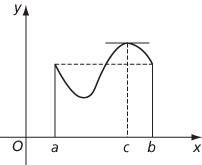Let f be a continuous function on [a,b] and differentiable on (a,b), such that f(a) = f(b). Then there exists c with a<c<b such that f′(c)=0.

Two stationary points in (a,b)
The theorem is a special case of the mean value theorem. A rigorous proof relies on a continuous function on a closed, bounded interval attaining its bounds (Weierstrass’ Theorem).
- fines 10% test
- fine structure
- fine structure constant
- fine tuning
- finger domain
- finger lake
- Fingerlakian
- finger plan
- fingerprint
- fingerprint biometrics
- fingerprinting
- fining-upward succession
- finished sequence
- finitary methods
- finite
- finite automaton
- finite difference
- finite-difference method
- finite differences
- finite-difference time domain
- finite-element analysis
- finite element method
- finite-element method
- finite field
- finite impulse response